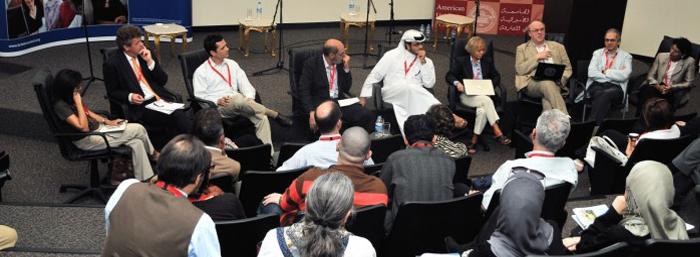- About
- Admissions
- Study at AUS
- Prospective Students
- Bachelor's Degrees
- Master's Degrees
- Doctoral Degrees
- Admission Publications
- International Students
- Contact Admissions
- Grants and Scholarships
- Sponsorship Liaison Services
- Testing Center
- New Student Guide
- File Completion
- New Student Orientation
- Payment Guide
- Executive Education
- Students with Disabilities
- Academics
- Life at AUS
- Research
- Contact Us
- Apply Now
- .

Call for increased dialogue between journalists and science community
A panel consisting of high-profile international and local members of the media called for increased dialogue between journalists and the science community at the closing session of the Middle East's first Belief in Dialogue: Science, Culture and Modernity conference, organized by the British Council in conjunction with American University of Sharjah (AUS) and held under the patronage of His Highness Sheikh Dr. Sultan Bin Mohammad Al Qassimi, Supreme Council Member, Ruler of Sharjah and Founder and President of AUS.
The closing media panel session chaired by Julia-Vitullo Martin, Co-Director of the Templeton-Cambridge Journalism Fellowships in Science and Religion engaged participants in a lively debate about the opportunities available in covering science, culture, and modernity as well some of the barriers. Participants included Francis Matthew- Editor-At-Large of Gulf News ; Nabil Khatib-Editor-in-Chief of Al-Arabiya News Channel ; MishaalAl-Gergawi, blogger and social commentator; Martin Redfern-BBC World Service; John Siniff-USA Today; Andrew Brown-The Guardian ; Ehsan Masood-Editor, Research Fortnight; Dr. Qanta Ahmed- Author, Associate Professor, State University of New York and Contributor to the Huffington Post and Abeer Al-Najjar-Assistant Professor, American University of Sharjah.
The panel session, which was open to the public, was attended by members of the local media and university students. The need for more diversity in the region's media including the recruitment of reporters dedicated to covering science, culture and religion was at the forefront of the discussion. The panel criticized the region's lack of specialized journalists, saying more needed to be done to tackle complex and often sensitive issues of science, religion and culture. Members of the audience suggested that local editors commit to appointing niche reporters who could simplify complex issues and generate reader interest in subjects which are challenging and sometimes controversial.
Fern Elsdon-Baker, Director of the British Council's Belief in Dialogue program, commented on the closing panel session, "It's clear from this discussion that our cultural understanding of science is highly dependent on how the media communicates it. Greater resources and training must be committed by the media and researchers in this field, as global links and better dialogue will partly depend on our appreciation of scientific development and the possible changes that can come from it."
On the sidelines of the closing session, Dr. Nidhal Guessoum, Professor of Physics, AUS, urged the local media to report on developments in the field of science, saying, "We are seeing fewer students interested in pursuing careers in science and research as those types of jobs are typically perceived as not glamorous or financially lucrative enough. The majority of students I speak to cannot name even one Arab scientist yet they can confidently list a number of Arab entertainers, entrepreneurs and athletes."
"It is the joint responsibility of the science community and the Arab media to alter outdated perceptions of science in our society and motivate our youth to take a renewed interest in issues of science, theology and culture."
Over 40 of the world's leading thinkers from across 10 countries convened at AUS for the Middle East's first Belief in Dialogue conference, which is part of the British Council's global Belief in Dialogue program.

